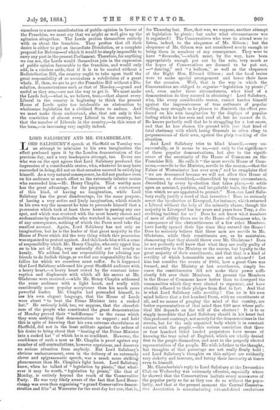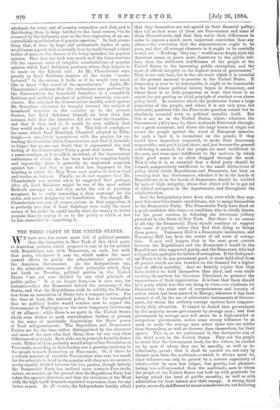LORD SALISBURY AND MR. CHA.MBERLAIN.
T,ORD SALISBURY'S speech at Sheffield on Tuesday was an attempt to minimise to his own imagination the effect produced upon it by the London demonstration of the previous day, and a very inadequate attempt, too. Every one who was on the spot agrees that Lord Salisbury produced the impression of a considerable orator, who, whatever he may have succeeded in doing, did not on that occasion succeed in satisfying himself. As a very natural consequence, he did not produce even on his audience as much effect as the extremely inferior orator who succeeded him—Mr. Henry Chaplin. That worthy man has the great advantage, for the purposes of a contioversy of this kind, of having no imagination, while Lord Salisbury has the great disadvantage, for the same purpose, of having a very active and lively imagination, which stands in his own way the moment he tries to persuade himself that a procession which took at least three hours in passing any one spot, and which was received with the most hearty cheers and acclamations by the multitudes who watched it, meant nothing of any consequence, nothing of which the Peers need take the smallest account. Again, Lord Salisbury has not only an imagination, but he is the leader of that great majority in the House of Peers which did the very thing which this procession was organised to protest against. And this loads him with a sense of responsibility which Mr. Henry Chaplin, who only egged him on to his act of folly, very naturally did not feel nearly so keenly. We seldom feel our responsibility for advising our friends to do foolish things, as we feel our responsibility for the follies for which we ourselves must suffer. So it happened that Lord Salisbury addressed his great Sheffield audience with a heavy heart,—a heavy heart cowed by the constant inter- ruption and displeasure with which all his sneers at Mr. Gladstone were received,—while Mr. Henry Chaplin addressed the same audience with a light heart, and really with considerably more popular acceptance than his much more powerful leader. Mr. Chaplin had persuaded himself, to use his own elegant language, that the House of Lords were about "to beat the Prime Minister into a cocked hat." He seriously held, too, we Etuppose, that the cheerful- ness of the people who constituted the great demonstration of Monday proved their " indifference " to the cause which they were making that demonstration to support ; and held this in spite of knowing that his own extreme cheerfulness at Sheffield, did not in the least militate against the ardour of his desire to bring about that "beating of the Prime Minister into a cocked hat" of which he is so 'confident. However, the confidence of such a man as Mr. Chaplin is proof against any number of self-contradictions, however capricious, and deserves no serious attention from anybody. But Lord Salisbury's obvious embarrassment, even in the delivery of an extremely clever and epigrammatic speech, was a much more striking phenomenon than Mr. Chaplin's light heart. Lord Salisbury knew, when he talked of "legislation by picnic," that what- ever it may be worth, "legislation by picnic," like that of Monday, is entirely beyond the reach of the Conservative Party. He was very likely aware of the fact that Lord Beau- chap was even then organising " a grand Conservative demon- stration and fete" at Worcester for the next day but one, that is,
for Thursday last. Now, that was, we suppose, another attempt at legislation by picnic ; but under what circumstances was it organised ? The Conservatives who were to attend were to listen, indeed, to the eloquence of Mr. Gibson ; but the eloquence of Mr. Gibson was not considered nearly enough to bring them in numbers of any consequence. They were to have "fireworks,"—which must, by the way, have been appropriately enough put out by the rain, very much as the hopes of Conservatives are doomed to be put out, —" dancing," and "a balloon," as well as the eloquence of the Right lion. Edward Gibson ; and the local trains were to make special arrangement and lower their fares for the occasion. Well, that is the way in which the Conservatives are obliged to organise "legislation by picnic ;" and, even under these circumstances, what kind of a demonstration do they succeed in obtaining ? Lord Salisbury, who, like every considerable orator, cannot harden himself against the impressiveness of true outbursts of popular feeling, may struggle as he pleases to diminish the effect pro- duced on his own imagination by the displays of popular feeling which he has seen and read of, but he cannot do it. He knows perfectly well that he is struggling for a lost cause, and that he has chosen his ground with just that kind of fatal obstinacy with which losing Generals so often cling to prepossessions of their own, against the plain teaching of the situation.
And Lord Salisbury tries to blind himself,—very un- successfully, as it seems to us,—not only to the significance of these •popular demonstrations, but also to the signifi- cance of the unanimity of the House of Commons on the Franchise Bill. He calls it "the most servile House of Com- mons,—servile to the Minister, servile to the caucus,—that the Palace of Westminster has ever seen ;" and he complains that "we are denounced because we will not allow this House of Commons, so discredited,—discredited by every circumstance, discredited by every by-election that takes place,—to settle upon an unsound, partisan, and inequitable basis, the Constitu- tion which we are appointed to protect." Now, can Lord Salis- bury really justify a word of that invective ? Does he seriously assert the by-election at Liverpool, for instance, which returned a Liberal without the help of the minority clause, though the majority in Liverpool has for years and years been Tory, a dis- crediting incident for us ? Does he not know what numbers of men of ability there are in the House of Commons who, in consequence of the obstruetiveness of a few other Members, have hardly opened their lips since they entered the House ? Does he seriously believe that these men are servile to Mr. Gladstone, while their constituents are, as be maintains, clamouring that they should throw over Mr. Gladstone? Does he not perfectly well know that what they are really guilty of is not servility to the Ministry or the caucus, but loyalty to the great majority of their constituents, and that that is a kind of servility of which honourable men are not ashamed 1 Let him but consider the events of 1866, how a great Cave was formed, and the Ministry at last overthrown, simply be- cause the constituencies did not make their power suffi- ciently felt over their Members. At present the Members in the House of Commons know better than to disregard the communities which they were elected to represent, and have steadily adhered to their pledges from first to last. And that is what Lord Salisbury calls servility ! Can he in his own mind believe that a few hundred Peers, with no constituents at all, and no means of gauging the mind of the country, are better representatives of that mind than 640 men whose poli- tical life depends on the will of the electors ? It is to us simply incredible that Lord Salisbury should in his heart feel this profound contempt, not merely for the demonstrations in the streets, but for the only organised body which is in constant contact with the people,—this serious conviction that three or four hundred titled landed proprietors have means of knowing the true mind of England, which are wholly denied first to the people themselves, and next to the properly elected representatives of the people. His wish is father to the thought, but thoughts of that parentage are not really firmly held ; and Lord Salisbury's thoughts on this subject are evidently very ricketty and insecure, and betray their insecurity at times even to himself.
Mr. Chamberlain's reply to Lord Salisbury at the Devonshire Club on Wednesday was extremely effective, especially where he showed that the Conservatives imitate every manceuvre of the popular party so far as they can do so without the popu- larity, and that at the present moment the Central Conserva- tive Association is manufacturing cut-and-dried resolutions
wholesale for every sort of country committee and club, and is distributing them in large batches to the local centres, "to be returned by the halfpenny post as the free expression of an un- controllable manifestation of popular emotion." In fact, every- thing that, if done by large and enthusiastic bodies of men, would mean a great deal,is actually done by small though violent bodies of men, on the chance of its being mistaken for popular opinion. That does not look very much as if the Conservatives felt the supreme scorn of irregular manifestations of popular opinion which Lord Salisbury professes where they happen to be made on the Liberal side. As Mr. Chamberlain says, greatly as Lord Salisbury despises all the works " manu- factured " by the caucus, it looks as if he would very much like to know "the secret of the manufacture." Again, Mr. Chamberlain's evidence that the enthusiasm now professed by the Conservatives for household franchise, is a completely fictitious and artificial product of political necessity, was con- clusive. Not only had the Conservatives steadily voted against Mr. Trevelyan whenever he brought forward the subject of household franchise in the counties up to the present Session, but Lord Salisbury himself, no later than last autumn, held that the labourers did not want the franchise, and that if they had it, it would be very unlikely that they would make a good use of it. This line of conduct,— the same which Lord Randolph Churchill adopted in Edin- burgh,—is completely inconsistent with the passion for ex- tending the franchise which Conservatives now find it desirable to feign; but no one can doubt that it represented the real feeling of the Conservative Party a great deal better. When a nurse overlays, as it is called, an infant, of the inconvenient restlessness of which she has been heard to complain loudly and repeatedly, there is generally an unpleasant suspicion against her ; and that is just what has happened to the bantling in which the Tory Peers now profess to feel so fond and tender an interest. Finally, we do not suppose that Mr. Chamberlain was serious when he suggested that perhaps, after all, Lord Salisbury might be one of the most ardent Radicals amongst us, and that under the veil of patrician arrogance he is really concealing a deep contempt for his order, and secret designs for its humiliation. But though Mr. Chamberlain was not, of course, serious in that suggestion, it is perfectly true that if Lord Salisbury were really the worst enemy of his order, he could hardly show his enmity to better purpose than by urging it on to the policy to which at last he has succeeded in committing it.



































 Previous page
Previous page